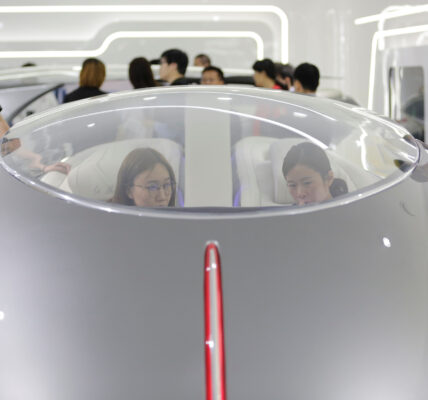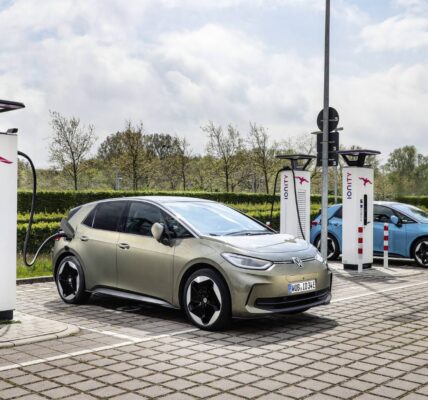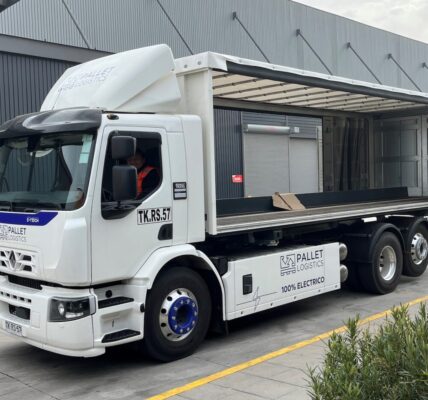Even as Germany’s national football team scrapped its way to victory in Dortmund on Saturday, a game of geoeconomic chess was taking place on the sidelines, with stakes that go beyond the European Championship.
China’s BYD was looking to land a marketing blow on Volkswagen on its home turf — and deepen Germany’s exposure to China in the process. With the Wolfsburg-based giant struggling to get its electric-car strategy on track, the Chinese brand is piling on the pressure as a sponsor of the Euro tournament. As well as providing a shuttle service with about 300 cars, BYD is stationing vehicles in fan zones to showcase features like in-car karaoke, and offering ticket giveaways via social media.
“BYD’s sponsoring makes the brand more known in Europe and loads it with emotion,” said Marko Sarstedt, head of the marketing department at Ludwig-Maximilians-University Munich. “It’s a risk for Volkswagen’s EV strategy leaving the playing field to BYD.” Like other Chinese carmakers, BYD desperately wants to break through in Europe. Beijing had fanned the flames of expansion with generous subsidies on everything from cheap land to buying incentives and cars rolling off those assembly lines are now seeking a home.
With political tensions high with US, Europe is the most lucrative outlet available, but even there, headwinds are intensifying. The European Union is set to start imposing tariffs on Chinese-made electric vehicles next week. BYD vehicles though are set to get off relatively light with a 17.4% levy.
Despite the threat posed by China’s automakers, Germany is trying to prevent or at least soften the EU’s tariffs, reflecting the deep links between the two economies. Manufacturers like VW, BMW AG and Mercedes-Benz Group rely on China for the largest chunk of their sales, and some ship EV models made there to Europe.
Economy Minister Robert Habeck travelled to China last week to discuss the issue, and Beijing has dangled perks such as lowering its own 15% tariff on large-engine cars in return for Germany’s help in scrapping the EV levies, people familiar with the discussions have said.
So far, China’s push into Europe has been more of a trickle than a landslide. The most successful company by sales is SAIC Motor Corp. The Shanghai-based owner of the British MG brand sold about 97,000 cars from January through May in Europe, according to data from the European Automobile Manufacturers’ Association. That’s less than a fifth of the VW brand’s sales across the region, where 5.6 million sold in total.Despite overtaking VW in China last year, BYD is struggling to gain traction in Europe. In the first five months of 2024, the brand sold a little over 13,000 vehicles, according to data from Jato Dynamics. But it has scored points with its marketing push.
In Europe, 36% of car buyers aware of Chinese brands would consider buying a BYD model, according to an April survey of around 2,000 respondents by management consulting firm Horváth. Six months earlier, it was 10%.“This is already a sign of the European Championship effect,” said Georg Mrusek, an automotive expert at Horváth. “We see a rising openness toward Chinese manufacturers in Europe.”
BYD though has a long ways to go to counter Volkswagen’s market power in Europe. The Shenzhen-based company lists just 27 dealers in Germany compared with hundreds selling VW cars. And the challenge of overcoming cultural affinity was evident at BYD’s display near the Reichstag in Berlin.
Volkswagen has been noticeable by its absence. At the last European Championship in 2021, the German brand was one of the main sponsors and used the month-long tournament to promote the launch of the ID line of electric vehicles. This year, it decided to pull out as a main sponsor to save costs, leaving the field to its Chinese rival.
“BYD sponsoring Euro2024 on our home turf is normal competition,” a Volkswagen spokesman said. “We take that in stride,” he added, noting that the brand is still active via its support for five national teams, including Germany.








